What is a domain name? This is the question of many beginners asking plenty of times.
The domain name is a need to run a website, but it’s not always easy to know all of its sides, especially, you are a beginner. Is that right?
When I decided to build my first website some years ago, I, like you, didn’t know what a domain name was, how to connect it to a website, which is better to choose a .com or .net domain extension… In general, there are a lot of things to consider around the domain name at which I blinded.
So, I know that beginners often confuse domain names with a website or web hosting. If you haven’t learned it yet, all of these different terms seem difficult to distinguish.
In this tutorial, I will show you, the beginners, and those who want to re-organize their domain knowledge to better understand it; as well as how it works, and instructions to choose a good domain name for your future website.
Now let’s get into the details! Are you ready?
What is a domain name?
A domain name is an address that when you enter it on a web browser, it will lead to a website.
Example for you to know more: Google’s domain name is google.com, the domain name of the website you are viewing is thomwebsite.com.
A domain name is unique for each website. This means that a domain cannot be shared or led to more than one website.
To make it easier for you to visualize it, you can image the domain name as your house number, leading to your house (a website).
That core is to get fundamental ideas about the domain name. This part is the extended content for those who want to learn more about it.
The internet is a huge network of servers connected to each other so that people far away can access information stored on them. Each server is usually assigned an address, called an IP address.
There are two types of IP addresses: Ipv4 and Ipv6. Ipv4 addresses have a simpler structure than IPv4. For example: IPv4 is 123.100.91.67 and IPv6 is 2001: ee0: 4c08: a350: 6105: 7fe: e930: 6ef6
Looking at those numbers is not easy to remember for everyone. Also, checking the information on a website stored on the server is very difficult with too complex numbers’ address.
Therefore, the domain name has been set up to solve this problem. Thus, under each domain that is easy to remember and interesting, that is a string of a complex character.
Is it awesome? You now can view the information on any website without having to remember the above boring numbers.
For example, you only need to type thomwebsite.com name, you will come to my site in English; typewrite amazon.com to go shopping…
Let’s close this part temporarily! Because the more we analyze it, the more complex it is.
Continue to reading the next part to find if it is more interesting.
How does the domain name work?
The domain is set up for a website or a server.
When you enter a domain name in a web browser, it will work as follows:
- A request (in specialized terms, called queries) will be sent to the global connectivity system, which is the domain name system (referred to as DNS).
- The DNS will search for the server connected to the domain being queried, and when it finds the server, it will forward these requests to that server.
- When the server (linked to the domain name, usually where the website is stored) receives the above requests, it will respond to the data back to the user. Usually, that s is the content of the website you want to visit.
Is this part simple? Now continue to see the next part to find if how the domain is.
>>> You may want to read an expired domain.
Are domain and website the same?
A website and domain name are completely different.
The website contains contents and data (like your house) built on PHP source code like on WordPress, HTML, another code, etc.
The domain name is the address to the site, that is the identifier (house number).
A domain (including subdomains) refers to only one website, but a website may have multiple referring domains. Like your house, there are possibly a new number and an old one.
The domain name associated with the website makes it easier for readers to access the information stored on that website. In essence, the domain leads to the server hosting the content of the site.
In short, for running a website on the internet, you need a domain name connected to a server where the site’s content is stored.
Thus, these are two separate services that you can buy at one or two different companies. I sincerely recommend that you buy it at two different companies, a domain name provider like namecheap.com. As for the server (rewarding a small website, often use shared hosting), it should use sectorlink.com or fastcomet.com.
There are also many other good suppliers, but I’m used to and like these companies, so I’ll give you instructions to them.
Some of you may ask: “Why should I buy a domain name and hosting from two different providers?”
No one is good at both jobs. Some firms are good at providing domain names, and others supply hosting.
As you know, each field is a thousand issues that require intensive knowledge. It’s not easy to open a service and sit there and collect money. Not easy, guys? The only problem is that security can make you feel headache.
Another problem is, when you are not satisfied with either of the two services, you can easily move to another place without trouble. Though companies providing these services don’t bother you, it is safe to separate them at two places in case.
What else is there?
Different types of domain names
There are many ways to classify domains. And, depending on the classification, the domain names will have different forms. Basically as follows:
- Global or worldwide domain names: This type of domains has many forms with different extensions .com, .net, .org, .info, .ai… The most popular is .com.
- Country domain name: The domain name of each country with an extension that is a sign defined by the international domain name organization ICANN. With the United States has the extension .us, in the UK is .uk, in Singapore is .sg, in Australia is .au…
Besides, you sometimes see different types of national domains, for example .com.au, .edu.au, .org.au, .net.au… These are the lower levels of the senior Australian domain name of .au.
The second classification that when you work a lot of websites (especially those you specialize in web design), you will meet. They are the main domain and subdomain.
- The main domain name: looks like this: yourname.com or yourcompany.org …
- Subdomains created from the main domain have the form: blog.yourname.com or shop.yourcomany.com…
Sometimes, you can also hear someone say it’s a free domain and a paid name. This one is not different from the above.
However, free domain names are usually provided by a website service company to attract users.
And free names often have the structure of yourname.theirwebsite.com. For example, the free name of wix.com (the blog and website building platform) is yourname.wix.com, or quora.com (the global question and answer platform) is yourname.quora.com, wordpress.com is yourname.wordpress.com.
I recommend not using a free domain name for your business or creating any blogs or websites with the intension of earning in the future.
Which organization is responsible for the domain name system?
For international domain names (.com, .net, .org…): Internet Corporation for Assigned Names and Numbers (hereinafter called ICANN) manages the domain system. This is a non-profit organization set up to create and implement policies for international domain names.
ICANN licenses companies that are allowed to register domain names often called domain name registrars or suppliers. Subsequently, these domain name suppliers distribute and resell domain names to other individuals and organizations. Therefore, individuals (or unlicensed organizations) cannot directly register domain names with ICANN. Thus, the purchase of your domain must go through authorized organizations.
These domain name registrars are responsible for securing registration information, managing records, and making changes on your behalf.
However, as a domain owner, you have a duty of announcing and updating domain-related information to the suppliers. You also have a responsibility to pay fees and renew their domain names on time.
For the national domains, depending on the management of each country, the domains will be managed and registered in different ways. However, in general, if you want to have a national domain, you are the citizen of that country or you have business opening regularly in that nation.
Places to buy international domain names
With international domain names, you can register with registries in your country and international domain suppliers.
With a worldwide domain, you can register quickly because most suppliers have had a good management system. The famous international registrars are:
- Namecheap.com (my favorite one)
- Name.com
- Goddady.com
However, when working with international companies, you must have an international payment card (VISA, Master Card …) or PayPal to pay fees for the domain name and to renew the domain name.
Can I buy a domain name directly from a website developer? All domain registrations must go through the organization authorized to provide domain names. So if a website developer or design company building your site is allowed to provide the domain name, then you can buy one. However, most professional individuals or web design companies do not provide domain names. However, if you are a person who does not know much about domain names and the internet, you can have these individuals to register for you. And, when they register a domain, they must also buy it through organizations that are authorized to distribute domain names.
How to buy a domain name?
Buying a domain name is not difficult. For most suppliers, you must have an account to use on their website, and you start buying the domains you like.
I will show you a few basic steps to buy a domain name on namecheap.com.
1. Go to https://www.namecheap.com, you will immediately see the domain search.
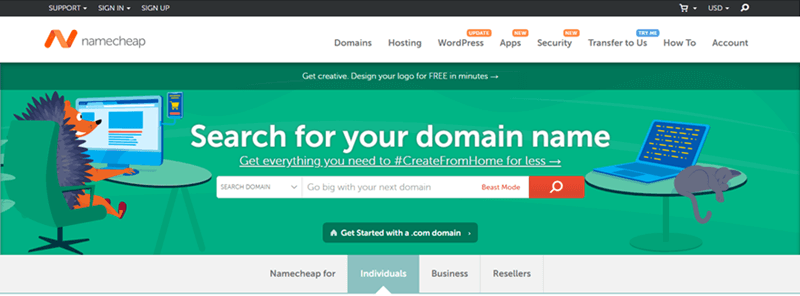
2. Enter a name in the search box, and click the search button. This will perform a domain and check if it is available for registration. If the domain name has not been registered, it will appear with a green checkmark and the “Add to cart” button next to the name.
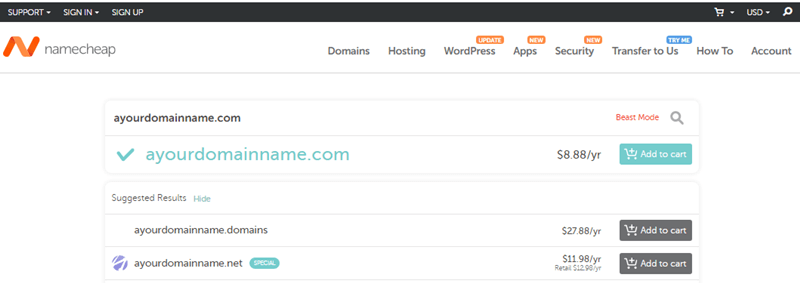
3. Select “Add to cart” and select the “Check out” button. The website will take you to the product information page you just selected, you check the price and domain name again for accuracy.
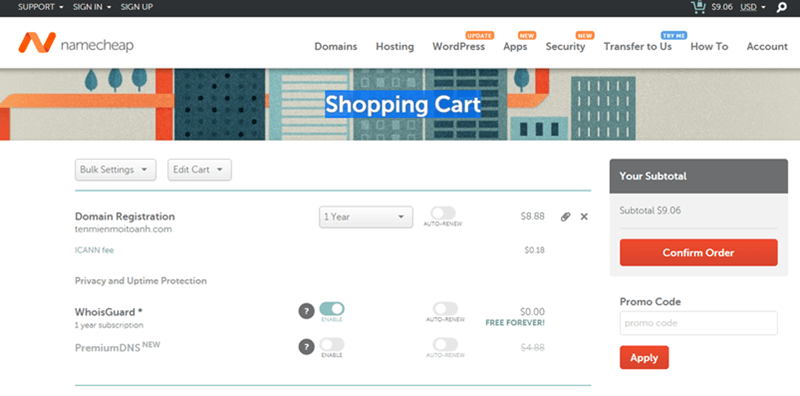
4. Select the “Confirm Order” button. You will go to the account creation page. If you do not have an account on Namecheap, enter the following information: password, first name, last name, and email, then select the “Create Account and Continue” button. You will receive an email for account verification.
If you already have an account, then log in to proceed with payment.
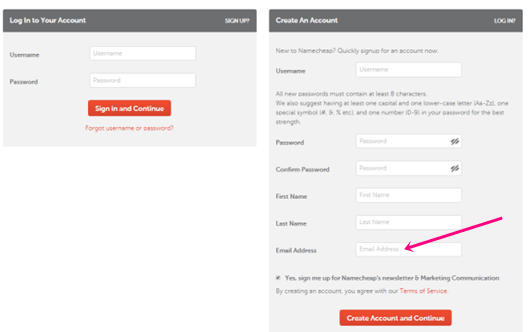
5. Namecheap takes you to the page of the payment method where you can choose a different way to pay.
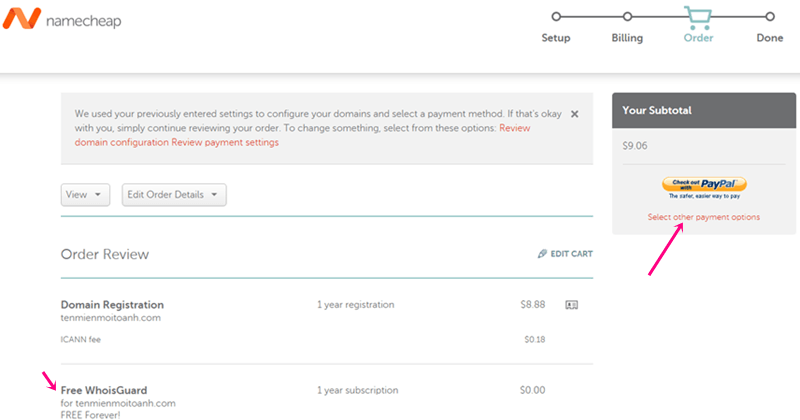
If you want to pay by Paypal, then you select the PayPal payment button. Very fast.
And you want to pay by Card VISA, Master … then select “Select other payment options”. Enter your card information into the required boxes.
6. Finally, select the “Continue” button. Wait for a while for the system to make payment and provide the domain name.
That’s it! You already own the domain name.
Price of a domain name
The cost to own a domain name varies depending on the provider, the type of domain name (international, national), and extensions of .com, .net, or .org extension…
In general, the average price for popular international domains is as follows (Namecheap for reference):
| Domain | New registration | Renew |
| .com | $8.88 | $12.98 |
| .net | $11.98 | $14.98 |
| .org | $12.98 | $14.98 |
| .io | $28.88 | $34.88 |
| .ai | $58.88 | $68.88 |
| .info | $14.98 | $14.98 |
Advantages of each type of domain name
Many of you ask when you own international domain names? When to use national domains? When should I buy .com, .net, .edu, or .ai?
In this section, I will give the advantages and points for you to choose the right one.
The most common domain name is an international domain name with .com extension. This is considered as the king of the domain names.
With its features also tell the important roles: International domain names have worldwide faces, are more popular with many internet users. Besides that, .com or .net … easy to remember for most people.
International domains have other extensions like .travel, .ai, .io, .shop, .store, .app … it is hard to remember, right? Therefore, they are not very common, only people in the same industry will feel familiar and use them.
So a domain extension with .com extension is the top choice for most websites. I recommend that you choose a domain with the .com extension, this is the first choice. If there are any names you like, then grab them, stop hesitating.
Who knows:” How well has your business grown?” Thinking about the international level is no strange because the world has been flat for a long time.
Next is the other common worldwide names, I put their popular-used fields in the following table for your easy look:
| Domain extension | Fields that often use |
| .com | General fields |
| .net | Information technology, internet |
| .org | Organizations, gorvenments |
| .io | Startups often related to technology |
| .ai | Artificial intelligence |
| .info | Information technology |
The superiority of international domains, especially of .com, is very big. However, the most disadvantage of international domain names is security. Although domain providers have a good security team, unlucky situations of losing international domain names are unavoidable, and taking it back is also arduous.
Contrary to its disadvantage, the national domain names are often protected by the organization of the internet in each country. Thus, the dispute resolution to regain domain names for individuals and businesses is previously is somewhat easier. So the loss of local domains seems to be impossible.
Besides, the top level of domain names of nations are selected first; it means that if you are in Australia, .au is the first choice, the next is .com.au, .net.au…
Above are the pros and cons of general knowledge. There is also a very important issue that is the ability to support websites to rank on Google, which is SEO capabilities.
Increasing rankings on Google through domain name selection is of great concern to SEOers, as well as those who want to improve their websites to popularize their business.
Telling details of domains with rankings on Google needs a long post. Thus, I only mention this side with the selection of the domain extension to make it simpler and easier to grasp.
International domain names with extensions .com, .org, .net … are good for business and reader with global range. Therefore, your customers are foreigners, everywhere (Europe, Australia, USA, ASIA…), the international domains will be easy to do SEO. The selection of international names is essential.
With national domains (example .com.au, .org.au, .net.au..), it has regional characteristics deeply. So Google prioritizes higher rankings in that country. So, your readers and customers only in your nation, the local domains are optimal. No need to set up a location in google webmaster as you choose .com domains.
However, why do I recommend that you choose .com first? Because I am always thinking of expanding your business globally, .com is necessary. When you have a .com, and if your customers are only in your country, the process belongs technically to zoning. It is located in the Google Webmaster management section. Come there and go to the location part, you set up the country which you want your website to display the most.
Suggestions to choose a good domain name
By the beginning of 2020, there are approximately 360 million domain names registered worldwide. Choosing a good domain name with .com extension is difficult at this time.
How is a domain name recognized?
The following can help you locate a nice domain, then you use it at the reference to select one for your blog or ecommerce website:
- A domain name with the preferred .com extension, (in your own country, that is often the top level.)
- Names that are short, for example, grab.com, uber.com,…
- Names that are easy to remember and easy to spell, for example, alibaba.com, amazon.com…
- Names without numbers, or dashes,
- Domain names that relate to the subject of websites, services, products, etc. For booking.com, read it and know instant business services.
What is the domain name you buy? Share with us!
Frequently asked questions about domain names:
1. How many domain names can I register?
You have the right to buy unlimited domains. The only problem is funding. With only a few dollars for a name, it seems not much. But when you own a dozen or more domain names, the issue of finance can not be ignored.
2. Where can I buy cheap domains?
Most domain providers have similar prices. Therefore, choosing a supplier should not be based on cheap criteria.
However, there are a few vendors that offer promotions, you must watch the promotion to buy if you want to be cheap.
And the domain name that is really cheap with some cents a year has strange extensions, is not professional. You need to pay attention not to be cheap because some providers give the first-year registration with very cheap. But when renewed it, the price is skyrocketed.
3. Can I buy or sell domain names as normal goods?
You are allowed to buy and sell the domains you own. However, sales must be based on business conditions. This purchase is not a domain registration; because licensed organizations are just allowed to register and provide domain names.
Therefore, the purchase and sale of the domains that you own must be through the domain provider and according to the law.
Please note the rules of each country and each area where you buy and sell domains as normal products!
4. When I have a domain, can I run a website?
To run a website with the domain you have just purchased, you need to have the following factors: domain name, web hosting, and website content. Thus, only with the domain name, you can not run a web, as you have the number of land plots without building a house, you cannot stay there.
Therefore, you need to buy hosting to store website information, ask a web developer who set up the website, and when you connect on the domain with hosting and content, there will be a complete website. You can see the way to connect a domain with hosting at the sep 2.
5. Can I create an email under domain name?
Of course. When you own a domain name, you must have a connection with the hosting and hosting provider that allows you to create an email (or you have to buy additional email service of the domain name provider), then you will create email under your domain name, for example you@yourdomainname.com.
I recommend you should buy hosting that includes email services to create emails according to the domain name.
6. Should I use additional services to protect personal information on the domains?
If you do not mind extra costs or some providers have free services like Namecheap, then you should use it. This ensures privacy and avoids phishing or spam mail services.
7. Can I switch domain providers?
Yes, you can change domain registrars by transferring domain names from one provider to another. Providers are not allowed to make users difficult.
However, switching suppliers sometimes have difficulties with ICANN’s ability to update information. And when the conversion does not go smoothly in the right way, it can affect your website rankings on Search Engines.
8. Can I cancel a domain registration?
After successful domain registration, some domain providers may allow you to cancel your registration. Others allow leaving domain name expired. But generally, domain name registrars will not give you a refund when you cancel a registered domain name.
9. Can I transfer the website content to another domain?
Of course, you can transfer website content to another domain. However, this is very careful if not, Google as well as other search engines bookmark the site with double content. The double content is a very bad thing to do with the ranking of a website on search engines, especially Google.
10. Do I need to use SSL for domain names and websites?
The use of SSL (Secure Sockets Layer) is not mandatory. Usually, websites that provide information, do not make purchases or pay online, rarely use SSL.
Some people said that SSL can help a website rank better on the search engines. This issue is still discussed because SSL is just one of the hundreds of things to rank a website on Google.
But, as I experience it when a website has an SSL, it is easy to run on Google Chrome.
Do you still have a domain problem? Leave a comment below if you have questions. And share the article to support my effort!







Leave a Comment
Log in to post a comment.